Human Rights

THERE IS A DISTURBING sense of déjà vu in the Philippines. Thirty-seven years after the nonviolent People Power movement ended the brutal and kleptocratic 20-year reign of Ferdinand Marcos Sr., his only son and namesake sits comfortably in the presidential palace. Following in his father’s footsteps, President Ferdinand “Bongbong” Marcos Jr. is once again cozying up to the United States.
In 2012, the Obama administration began to “rebalance” U.S. military and trade agreements in Asia. Since 2014, the U.S. has had access to five military bases in the Philippines and trains Filipino soldiers under the Enhanced Defense Cooperation Agreement (EDCA) — all part of Obama’s “pivot to the Pacific.”
In February this year, Marcos agreed to allow the U.S. military to pre-position troops and weapons at another four bases. This gives the U.S. the largest military footprint it has had in the Philippines in 30 years, when a Filipino-led anti-colonial independence movement led to the removal of all permanent military bases in their country.
In its push to expand EDCA, the Biden administration said it would spend $82 million on projects at the first five bases. In addition, U.S. ambassador MaryKay Carlson announced $100 million in new foreign military financing for the Philippines “to use as it wishes.” The Philippines is already the largest recipient of U.S. military assistance in the region, receiving $1.14 billion in weapons and equipment since 2015. U.S. and Philippines government officials claim that the purpose of this growing U.S. military presence is to help with humanitarian crises and disaster relief, as well as to prepare for a future conflict with China, most likely over Taiwan.
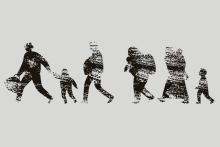
I KNEW ALMOST immediately it was bad news.
“Maria was separated at the border from her auntie,” my friend said in a phone call. “We don’t know where she is. Her auntie was sent back to Mexico and we think is being held by a drug cartel. They separated them under Title 42.”
I felt sick. Four-year-old Maria (not her real name) and her aunt were fleeing violent circumstances. They arrived at the U.S.-Mexico border to exercise their legal right — protected by both international and U.S. law — to request asylum, as other members of Maria’s family had done prior to the COVID-19 pandemic.
In March 2020, everything changed. The Trump administration, through the Centers for Disease Control and Prevention (CDC), invoked a rarely used subsection of public health code called Title 42 to close U.S. borders to asylum seekers and unaccompanied children under the guise of preventing the spread of COVID-19. It made that decision against the advice of many public health experts, including some within the CDC, who agreed there was no public health rationale for a ban on asylum seekers as a group. Though the border remained open to truckers, temporary workers, students, and others, border agents turned back asylum seekers to Mexico or their home country.

Pope Francis said on Monday that migrants were being exploited as “pawns” on a political chessboard in an apparent reference to the crisis at the Belarus border.
Thousands of migrants are stuck on the European Union’s eastern frontier in what the EU says is a crisis Minsk (Belarus’ capital city) engineered by distributing Belarusian visas in the Middle East, flying them in and letting them go to the border.

OUR CLOTHES BEAR more than our personal style. Stitched into favorite garments is the suffering of those who made them.
From Bangladesh to Vietnam, millions of garment workers are exploited to feed the burgeoning demand for ready-made wardrobes. These workers endure unsafe working conditions and workplace abuse to meet the mounting quotas imposed by hungry clothing brands—all while being paid pennies per hour.
Garment workers’ labor conditions seized the attention of international media in 2013 when the Rana Plaza factory collapsed in Dhaka, Bangladesh, killing more than 1,100 people. This disaster accelerated the work of human rights organizations such as the Worker Rights Consortium, the Maquila Solidarity Network, and the Clean Clothes Campaign that were already collaborating withcorporations to implement safety protocols in the supply chains. This collaboration birthed the Accord on Fire and Building Safety in Bangladesh (the “Bangladesh Accord”), which was the first international agreement to include global brands, retailers, and trade unions in a legally binding framework.
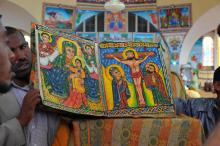
As a Tigrayan and a Christian, I want to know why my fellow Christians who claim to worship the Prince of Peace have engaged in legitimizing violence and death. How do you start with the theology of the gospels — which teaches us to love our enemies, to be peacemakers and to suffer with those who suffer — and end up with a theology that endorses war, rejoices in massacres and destruction, and brands critics as sub-human? Tigrayans are created in the image of God.

Pope Francis has a penchant for impeccable, maybe even providential timing. His encyclical Laudato Si’ came out just months before the 2015 Paris climate summit and played a key role in influencing public opinion and galvanizing political will behind bolder climate action to protect “our common home.” Now, less than a month before the most consequential U.S. election in generations, the pope’s new encyclical provides a powerful rebuke to a politics of division, fear, and hate while also casting a vision for the human family that is deeply relevant to applying our faith to U.S. leadership in the world.

HOW HAS AMERICA honored its avowed commitment to human rights over the last four years? Fellow nations will consider that question later this year during the Universal Periodic Review, a quadrennial evaluation by the U.N. Human Rights Council to which all member states are subject.
The review, scheduled for this spring before postponement due to the COVID-19 pandemic, promises a thorough accounting of U.S. progress and failings on human rights at home. Given the Trump administration’s withdrawal from global processes designed to safeguard human rights and its dubious moves to redefine the scope of human rights protections, this review is vital.
Central to human rights and our modern conception of justice is the idea of equality. No one is above the law. All should be treated fairly, without bias or favor—a value reflected in the biblical juridical instruction to not “be partial to the poor or defer to the rich” (Leviticus 19:15).
This principle of equality animates the review, a uniquely democratic process in which every nation can speak truth to every other and none is exempt. “Universality, impartiality, objectivity, and non-selectivity” are guiding principles. With no regard for American “exceptionalism,” the UPR’s egalitarian structure aims to blunt the politicized use of human rights, in the U.S. and elsewhere, against adversaries alone.
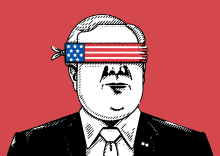
THE 2018 STATE-SPONSORED execution of Jamal Khashoggi, a Saudi journalist and Washington Post columnist, was a brazen violation of his right to life by a repressive regime, yet the U.S. executive branch responded with near indifference. Then Secretary of State Rex Tillerson had already said that advancing U.S. interests should come before promoting U.S. values—such as defending human rights—and his successor Mike Pompeo has followed suit.
The Trump administration has disavowed the longstanding commitment to human rights by the U.S. in foreign policy. It has withdrawn from the U.N. Human Rights Council, ceded a voice on the U.N. body addressing racial oppression, and ignored the chorus of international condemnation of its family separation policy.
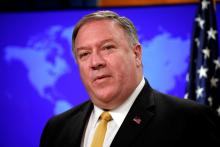
From July 16-18, Secretary of State Mike Pompeo hosted the second annual Ministerial to Advance Religious Freedom, which is touted as the “the largest religious freedom event of its kind in the world.” More than a thousand attendees representing delegations from 106 countries arrived in Washington D.C. to discuss challenges to religious liberty and how to collectively address the threats facing people of faith worldwide.
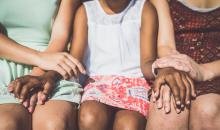
Some faith-based adoption agencies have a greater ability to adopt antidiscrimination policies than others; nondenominational agencies like Bethany can often change their policies after winning board approval, while Catholic agencies are beholden to Catholic doctrine on same-sex marriage. Due to the structure of the Catholic Church, Catholic adoption agencies would have to shed their Catholic identity to serve LGBTQ couples — something that St. Vincent would likely have had to do.

In the past the results of shareholder activism with private prisons, at best, have been mixed. A very similar resolution was introduced in 2016; it garnered a mere 24 percent of shareholder votes. But even if the upcoming resolution were to get 50 percent or more of the shareholder votes at the meeting, resolutions are not binding for any private company.

The Sudanese revolution is half-complete. On April 12, merely 24-hours after they had gotten rid of Omar al-Bashir, their dictator of 30 years, the Sudanese people were still out on the streets. They are out today too.
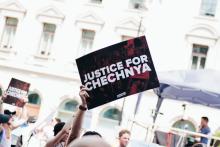
“The queer community in Chechnya is small, so if one was reported by their family member, they would be tortured to release the information of other gay people,” said Lyosha Gorshkov, the co-president of the Russian LGBT Network. “Many were kept in a basement for a couple of weeks and subjected to humiliation, torture, rape, electric shock. Some reportedly committed suicide."
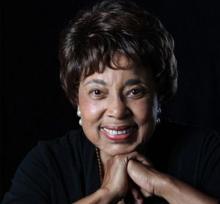
She was a leader in numerous institutes and organizations. She developed the Citizen Education Program where she trained marginalized people to become politically involved and organized and understand their civil. She was also a leader in the Southern Christian Leadership Conference, serving as an educational director in the 1960s.
4. Weeping Responsibly: 3 Ways White Women Can Learn to Grieve, Heal, and Stand Without Harm
Much has been said over the past couple of weeks about the impact of white women’s tears. Here, the author unpacks that and offers ways to stand strong in a misogynistic culture without harming others.
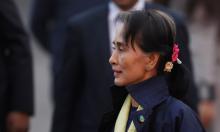
U.N. human rights officials have said Myanmar’s security forces may be guilty of genocide against the Rohingya Muslim minority. Since August, more than 600,000 Rohingya have fled to neighbouring Bangladesh since Myanmar began systematically targeting Rohingya armed groups.

The stall in funding for CHIP, federally-funded program that covers moderately low-income children in the U.S., leaves nearly nine million children and their families in a worrisome limbo.
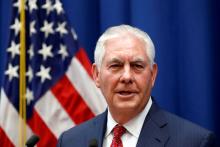
A confidential State Department “dissent” memo not previously reported said Tillerson breached the Child Soldiers Prevention Act when he decided in June to exclude Iraq, Myanmar, and Afghanistan from a U.S. list of offenders in the use of child soldiers. This was despite the department publicly acknowledging that children were being conscripted in those countries.

Today, the Rohingya are the single largest “stateless” community in the world. Their “statelessness” or lack of citizenship increases their vulnerability because they are not entitled to any legal protection from the government.
